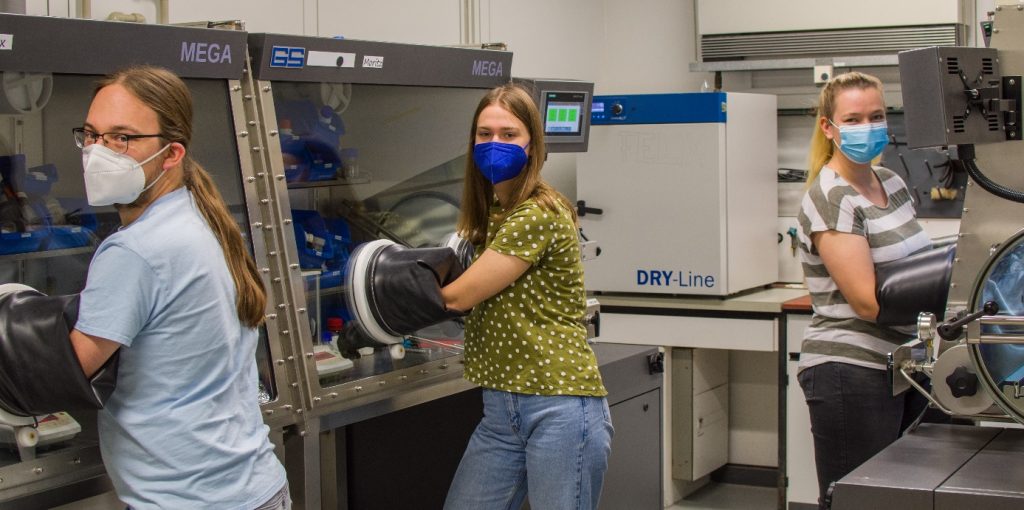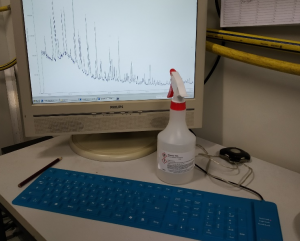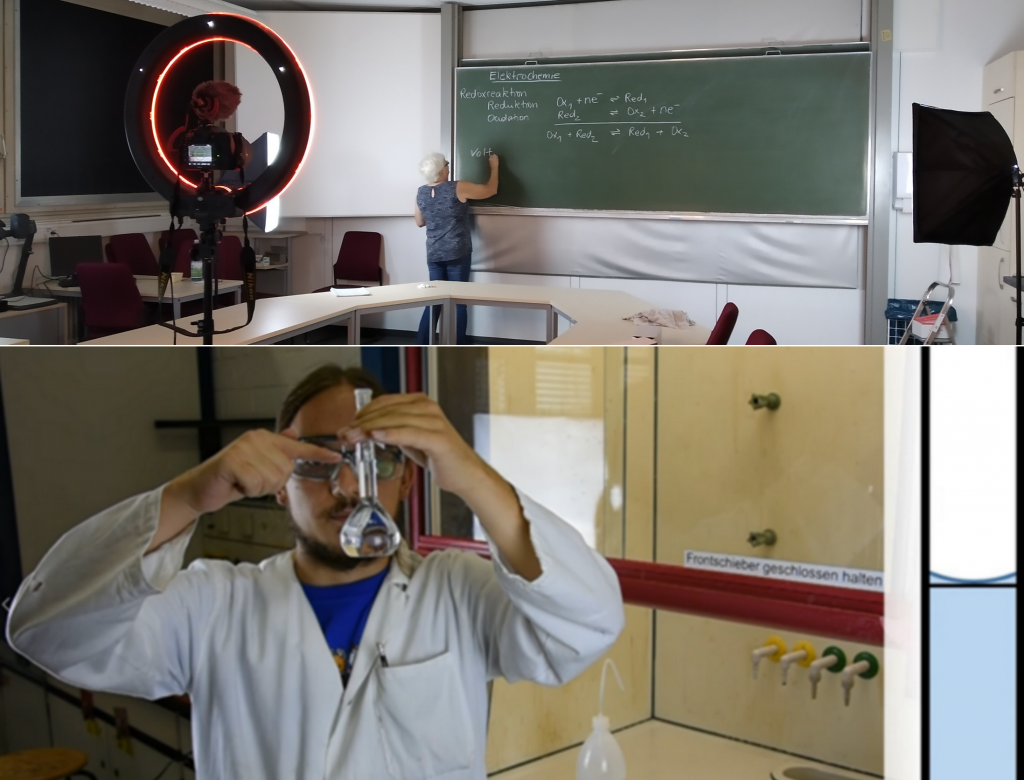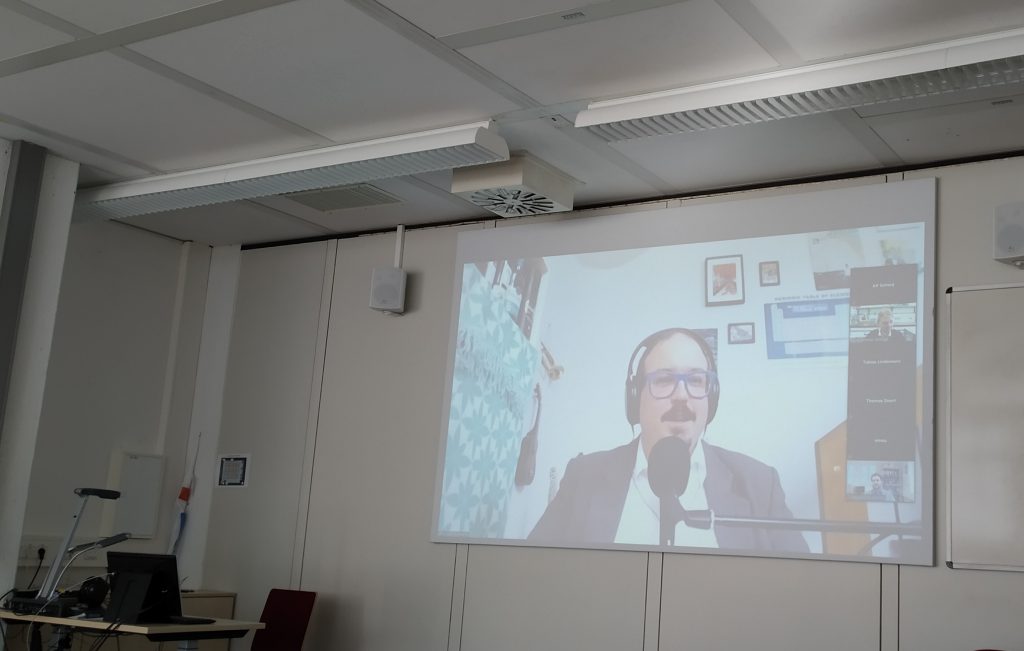
If you also have some interesting stories to tell about the pandemic, write them down and we will publish them! Tell us about your solutions in teaching, experimenting and research! We are curious how you managed the last year! Send your stories to Melanie.Nentwich@desy.de
A few weeks after the visit of the 1st Joint Polish-German Crystallographic Meeting in Wrocław, our institute (like the whole university and the whole country) went into lockdown. Accessing the university was only permitted for important and necessary tasks, e.g. to change the argon bottles for the glove box. To make the access to and the working at the university possible and safe, hygiene measures had to be taken. At our diffractometers, the keyboards had been replaced by washable keyboards and disinfectants had been placed everywhere people work together, like at the glove boxes.

Practical Courses
All lectures for students had either changed to online lectures or to pdf-data with voice notes and videos. The laboratory practical course for students of study programs like environmental engineering (who only learn the basics in inorganic chemistry) were shortened from 7 days in presence to 3 days. Also, some experiments were taught online, like the one using UV-VIS spectroscopy and “Instrumentelle Analytik”. The students got access to video material of the seminar and of the experiments. Then they had to write a protocol using theoretical values.

The preparation of these practical courses and especially the production of the videos was a huge amount of work for me, but still less than it was during the live events before the pandemic. In the practical course inorganic chemistry (AC) II and III, a nicely formulated hygiene concept allowed minimal attendance of several students at once. Each student was given a whole workbench; a one-way street system helped to reduce the number of contacts. Thanks to good discipline of the students, the AC II and III laboratories needn’t to be closed down, which gave students the possibility to improve their synthetic skills in inorganic chemistry using Schlenk-techniques or solid-state syntheses.
In the practical course for first semester students could also be done in presence, as covid-19 self-tests were handed out to each participant and as it was obligatory to wear FFP2 masks and to keep distance to the fellow students.
Conferences
Unfortunately, most conferences were also done online, so we missed the opportunity to visit beautiful cities such as Hamburg (DGK) or Cologne (Wöhler). But in the time of the pandemic, positivity is key! As we are Swabian people, we are happy that we saved some money which would have been spent for the train, the hotel and so on, so we could attend those conferences for very little money. We were able to attend the “Fachgruppentagung” of the GdCH online for only 10 €. Constantin also could visit the preATAM conference which should take place in Wroclaw without the pandemic. The DGK conference 2021 was visited from the university in a small group in the seminar room and we hope to visit the IUCr this year in Prague in real life again.

Publishing
Also in science, our group was not inactive during one year of pandemic. Constantin finished together with other authors two nice papers in the journals Solid State Science and Crystals about New layered oxide fluoride selenides of the lanthanoids Nd5OF5Se4 and Sm5OF5Se4 and the Hydrothermal Synthesis, Crystal Structure, and Spectroscopic Properties of Pure and Eu3+-Doped NaY[SO4]2 ∙ H2O and Its Anhydrate NaY[SO4]2 and Pia also wrote articles about novel rare-earth(III) thiophosphates(V) (published: https://doi.org/10.1515/znb-2020-0148 and https://doi.org/10.1515/znb-2021-0023, two other are submitted).
The Doctoral Students
For us as doctoral students very little had changed. We could continue our work in our laboratories almost with no setbacks. All kinds of meetings were now performed online: the weekly group seminar (moved to webex), the usual game of double side (Doppelkopf) during lunch break as well as the regular “Feierabendbier”.
The Bachelor Students
Of course, also bachelor theses were written during the pandemic time. This is a short report of Samira (Bachelor of Arts student in chemistry and sport science), who performed her bachelor thesis at our working group:
For me as a university student, in the 4th semester, when the pandemic began, a lot of things changed. As above already described, we had, and still have, most of the lectures online. Sometimes it’s nice, because you don’t have to wake up early and go to the University, but most of the time it’s sad to not see your friends and it’s harder to interact with the professors. In my opinion, the amount of things we had to learn didn’t get less and the exams didn’t get easier because of the pandemic. At our university, most of the exams were written normally and not online, which I personally liked. I study sports and chemistry with the goal to become a teacher. These are both subjects which need lots of actual practice and normally require presence lectures or exercises. This was sometimes hard, because we weren’t allowed to go to the university. In sports we weren’t allowed to touch each other and sometimes even had to wear masks while making sports. As you can imagine this wasn’t easy, but I think we made the best out of it and I’m glad that we had the opportunity to do sports at all. In chemistry, it was easier, because you can stay away from each other in the lab and wear masks. Now I’m in the 6th semester and I decided to write my bachelors thesis in chemistry. We are allowed to work normally and without masks in the laboratory if we are alone. Actually, I don’t think that it would be different, if I would have been there before the pandemic. When we leave the laboratory and walk around in the building or visit other laboratories, we have to put on our masks, but I think we have all gotten used to these masks by now. I’m really glad, that I can experience the everyday life in a science lab and learn more about crystal chemistry. By now, the pandemic doesn’t affect my studies that much anymore, because the university found ways to allow most of the important things.